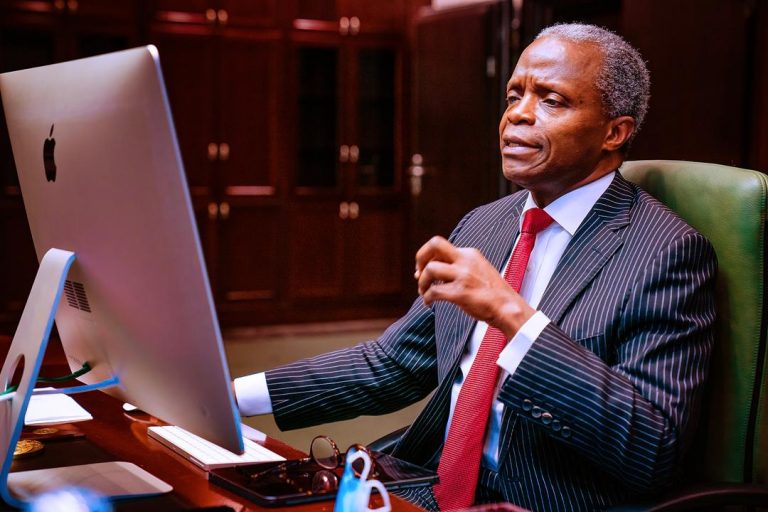News
Osinbajo Calls For Renewed Faith In Nigeria
All Nigerians, despite ethnicity, must join hands together to build a strong nation where everyone can legitimately aspire to the limits of their dreams and visions in all areas of national life.
Vice President, Yemi Osinbajo stated this today in his address at a special townhall meeting at the National War Museum in Umuahia, Abia State, commemorating the 50th anniversary of the end of the Civil War.
The event was hosted by the Civil War Museum in Umuahia under the National Commission for Museums and Monuments (NCMM) and the Ken Nnamani Centre for Leadership and Development (KNCLD).
In his address, the Vice President urged young Nigerians to shun ethnic prejudices and unite in building a better Nigeria.
“The generations born after the Civil War are navigating the adventure of being Nigerian on different terms from their forebears. Let us give them a chance to do better than ourselves,” the Vice President said.
He added, “Young Nigerians are intermarrying, migrating and comingling in the quest for love and livelihood; they are doing business together and forging alliances in civil society and politics across ethnic and religious divides.
“Our children are showing us that it is possible to forge friendships and bonds across ethnic and religious lines that are even stronger than family ties and this in itself evokes the possibilities of unity in diversity.”
Speaking further, Osinbajo described the civil war as a defining national tragedy about which robust national conversation is necessary to aid the process of healing and reconciliation.
He said, “In the 50 years that have followed since the end of the war, we have invested in national integration, peace building and reconciliation. That has been a lot less than perfect task. Our road has not been easy and we have faced many challenges along the way. But those setbacks should not induce hopelessness or despondency, but should constantly remind us that the stakes are high because of the incredible dividends of unity for us all.
“Our historic mission, therefore, is not just to build a nation that works for all of us, but to create a successful polity, an economic and social powerhouse capable of powering us and our continent to prosperity. And yet, nation-building is hard work, and bringing together the multiplicity of ethnicities, languages and creeds that make up this great land under one banner is an onerous but necessary task.”
Noting that the majority of Nigerians alive today were too young to have witnessed the Civil War and therefore have no memory of it. Prof. Osinbajo urged elders to avoid poisoning the hearts and minds of the young generations with prejudices.
The Vice President said, “The last 50 years belonged to us, but the next 50 belong to our children and their children and we have a responsibility to unshackle them from the ghosts of ancient grudges and grievances.
“As elders, we must ensure that we do not poison the minds of the young with our own prejudices and affect their ability to take advantage of the opportunities available to them in their country. We must also avoid foisting the toga of victim-hood and helplessness on the next generation.”
In his remarks at the occasion, the Chairman of the KNCLD, Senator Ken Nnamani, described the war as “a costly catastrophe that was provoked and prolonged by errors on both sides.” He said that the townhall was organized “to show that we can address the pressing issues of our time with a spirit of civility and maturity.”
The Vice President’s visit to the National War Museum, Umuahia, is part of a circuit that has seen him also visit museums in Benin and Kano. The visits, which include tours of the facilities with history students from local schools, are aimed at promoting national cohesion, rekindling popular interest in history, and encouraging tourist traffic to the museums and heritage sites.
The National War Museum was commissioned in 1989 and established to preserve the relics of the Nigerian Civil War, as well as serve as a centre for research on warfare in the country. It is also a memorial to the soldiers, civilians and other casualties of the Civil War and other conflicts in Nigeria.
The Governor of Imo State, Hope Uzodinma; Governor of Abia State, Okezie Ikpeazu; Minister of State for Steel & Mines Development, Dr. Uchechukwu Ogah; and the Official Spokesperson of the Federal House of Representatives, MHR Benjamin Kalu from Abia, also attended the event.
Others include community leaders, government functionaries, political leaders, students, academics, religious leaders, veterans of the war and representatives of civil society organizations in the South East zone.




Pingback: Stop Eating Rats To Avoid Lassa Fever - Minister Warns Nigerians - Gatekeeper